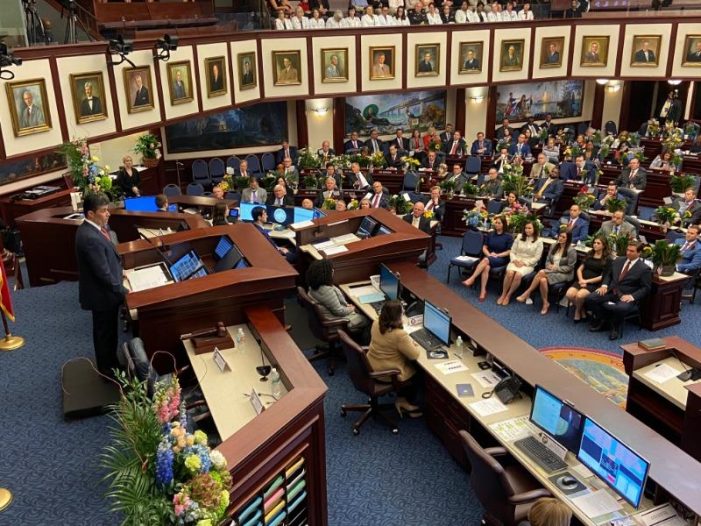By Ana Ceballos, The News Service of Florida
As Florida lawmakers inch toward a budget deal, House and Senate leaders on Saturday announced they had reached agreement on a number of key issues, including pay raises for state workers, funding for Visit Florida and leaving intact the affordable-housing trust fund.
Legislators, who also met throughout Saturday to iron out differences on the roughly $92 billion budget for the fiscal year that begins July 1, also earmarked money for the state to combat the novel coronavirus disease, known as COVID-19.
House budget chief Travis Cummings called the agreement on affordable-housing a major achievement.
For years, legislators have used affordable-housing tax dollars, which are collected through real-estate sales, for non-housing programs to balance the state budget. But this year, the House agreed with the Senate and Gov. Ron DeSantis to leave the fund alone.
“I think that’s a big win this session and I applaud Senate President Bill Galvano, Speaker Jose Oliva and the governor’s office,” Cummings, R-Fleming Island, said during a Saturday meeting that officially kicked off budget negotiations between the chambers.
The House had proposed spending $147 million and sweeping other affordable-housing trust-fund money to plug other parts of the budget. But House leaders backed down, leaving roughly $370 million available for affordable housing in the upcoming year.
Lawmakers also are honoring the governor’s $25 million request to address the costs associated with the outbreak of the deadly coronavirus, which has claimed two lives in Florida.
“What we are doing is we are supporting the governor. The governor has asked us for $25 million in order to be able to have the funds necessary for his efforts,” House Speaker Jose Oliva, R-Miami Lakes, told reporters Saturday.
Funding for Visit Florida, an ongoing battle between the House and Senate, has also been resolved.
Oliva and other House leaders had threatened to drain the state’s tourism-marketing agency’s budget, but lawmakers said Saturday the agency will stay alive for another year and receive an allocation of $50 million.
“We don’t want to tie the hands of the future legislators on what (Visit Florida) looks like,” Cummings told reporters on Saturday.
The House and Senate also agreed to a 3-percent across-the-board pay raise for all state employees, Senate Budget Chief Rob Bradley, R-Fleming Island, said.
While they reached consensus on a number of big-ticket items, lawmakers have yet to reach a deal on one of DeSantis’ biggest legislative priorities: teacher pay.
The governor asked the Republican-dominated Legislature to approve a $602 million plan that would set a minimum salary of $47,500 for public school teachers. DeSantis also asked legislators to set aside $300 million for a new teacher bonus program that would replace the embattled “Best and Brightest” bonus program.
Bradley, who is sponsoring a bill that would repeal Best and Brightest, said Saturday afternoon the state will no longer have a teacher bonus program, and that negotiations continue on the amount of money that will be set aside for teacher raises.
The Senate has proposed $500 million for salary increases, while the House is offering $650 million.
“We’re very close,” Bradley said. “As the offers roll out, I think you’ll see that there is very little daylight between the two sides.”
In addition to teacher pay, gaps remain between the House and Senate on the environment and criminal justice.
Cummings said the House is closing the funding cavity for the Florida Forever land-conservation program. The House’s spending plan included $20 million for the program, $105 million less than the Senate’s proposal.
“We are making some existential progress to get much closer to where the Senate is, quite frankly,” Cummings said.
Health-care budget conferees also met briefly Saturday.
Rep. MaryLynn Magar, R-Tequesta, said the House has backed off its original position to eliminate 500 positions from the Florida Department of Health, as the state prepares for the COVID-19 contagion.
The House also made offers on several Senate priority issues in the Agency for Persons with Disabilities, including a series of price -evel increases for the direct-care staff who work with people on the Medicaid iBudget waiver.
However, the House’s offer remains well below what the Senate had appropriated.
Gaps also remain on how the state wants to compensate correctional officers.
The DeSantis administration has called for a pair of initiatives that would help address “exceptionally high turnover rates” at the Department of Corrections. The state agency asked lawmakers for a $60 million retention-pay plan and a $29 million pilot program that would modify prison guards’ shifts.
The agency’s proposed pilot program would move one-third of Florida’s prisons from a 12-hour shift to 8.5-hour work days. Making the shift-hour change would require the department to hire 292 new full-time correctional officers.
The Senate recommended fully funding the pilot program, while the House’s budget proposal provided $13.6 million for the changes. The House plan would fund 174 new employees and move one-fifth of prisons to the 8.5-hour shifts, according to its budget proposal.
“In regards to the shifts, we still are a little bit off on that,” Cummings said Saturday. “We think that the 8.5-hour shift has a lot of merit to it and you’ll see an outcome that makes policy between the chambers.”
— Staff writer Christine Sexton contributed to this report.

